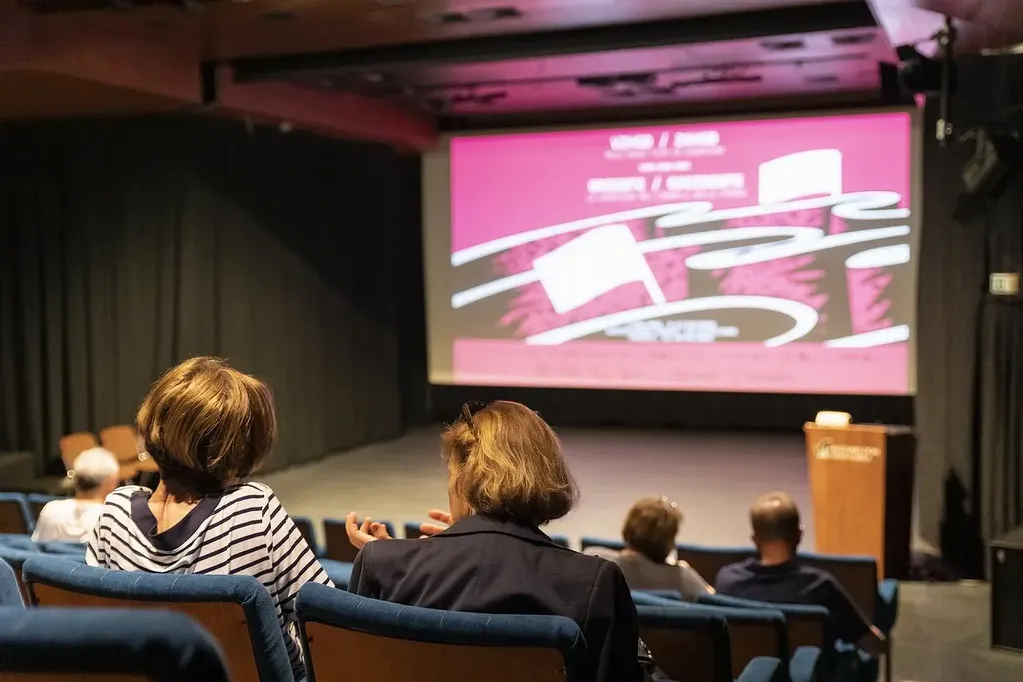Symposium 2022

The first retrospective and symposium, which took place from the 8th to the 16th of May in 2022, put Trieste at the center of the discussion. This strategic city is characterized by problematic relations between the allies in the East and the West and the rhetoric of the Cold War in the fight for the northern Adriatic border.
The project, coordinated by Kinoatelje in cooperation with many partners from Slovenia and Italy as well as from the wider region, offered a film retrospective and symposium in May 2022, which focused on the border between Italy and Yugoslavia in the period between 1945 and 1954. During the symposium, renowned historians, sociologists and film publicists - Raoul Pupo, Jože Pirjevec, Kaja Širok, Štefan Čok, Katia Pizzi, Lorenzo Codelli, Gian Piero Brunetta, Paolo Caneppele, Alessandro Cuk and others, reflected on the turbulent shared history of this area through the medium of film. The events took place in Ljubljana (Slovenian Cinematheque), Nova Gorica (Cultural center Nova Gorica), Gorica (House of Film) and Trieste (Cinema Ariston). The film retrospective was introduced by the world classic, one of the most recognizable creations of film noir, "The Third Man" (1949) by director Carol Reed, which depicts post-war Vienna, divided into four allied zones.
Selected Italian and Slovenian feature films that were made in the first post-war period; "Trieste" and "On Our Own" Land directed by France Štiglic, "Boundless Hearts" (Cuori Senza Frontiere, 1950) directed by Luigi Zampa, and "City of Pain" (La Città Dolente, 1948) directed by Mario Bonnard put Trieste in the spotlight. Both Italy and Yugoslavia produced an extensive collection of film reports and film newsreels during this period and although the footage documents the same events, they are often presented in completely different ways.
The symposium and retrospective were organized in May in 2022 by Kinoatelje, Slovenian Cinematheque and Trieste's La Cappella Underground in cooperation with the European project CBA TRIESTE - Cinematographic Battle for the Adriatic: Films, Borders and the Trieste Crisis (H2020 MSCA), led by Dr. Dunja Jelenković, researcher at Ca' Foscari University in Venice.
The initiative was presented at a press conference in the San Marco cafe in Trieste by Mateja Zorn (Kinoatelje), Lorenzo Codelli (La Cineteca del Friuli), Chiara Barbo (La Cappella Underground), Igor Prassel – (Slovenian Cinematheque) and Dr. Dunja Jelenković (Ca' Foscari University from Venice).
Mateja Zorn, program manager at the leading partner Kinoatelje, highlighted the importance of audiovisual and cultural heritage, with which they want to establish a dialogue with the general public, not only locally, but also internationally. This will become particularly evident with the retrospective, which the organizers want to host in various European cities in 2025. The program also offers reflection on "history, which unfortunately repeats itself and remains always relevant. With today's unstable political situation in Eastern Europe, the dangerous rhetoric of the Cold War, which we hoped had already been overcome, is re-emerging". The launch of the multi-year project would not have been possible without the support of the Autonomous Region of Friuli-Venezia Giulia.
Igor Prassel from the Slovenian Cinematheque presented the program of events that will take place in Ljubljana in May and emphasized the importance of films such as "Trieste" (France Štiglic, 1951), the work of one of the most important Slovenian film directors. The film was shot in Rijeka, because at that time it was still impossible to film in Trieste.
Film critic Lorenzo Codelli emphasized the charm of post-war Trieste, which was, so to speak, a "city of spies" and the setting of many film stories. This kind of world will be rediscovered through a program that finds content from international archives.
Chiara Barbo (Cappella Underground) focused on the program of the Trieste outpost, where a film walk is planned, which will also include locations in the city center that bear witness to the temporary presence of the Allied forces in Trieste. The film program in Trieste will also emphasize its literary dimension.
Dunja Jelenković presented her project CBA TRIESTE (H2020 MSCA – Ca' Foscari University of Venice), which will also develop an online database where information on films, photographs and other archival material bearing witness to the battle for the northern Adriatic border will be collected.
In conclusion, film critic Alessando Cuk emphasized: "This time, for the first time, we will be able to watch films from both sides of the border that deal with this historical period in a truly balanced way."
Announcements/
CBA TRIESTE The Cinematic Battle for the Adriatic: Films, Frontiers, and the Trieste Crisis
23. 04. 2023Both Italy and Yugoslavia produced a collection of films about their struggle for the northern Adriatic border (1945–1954). But even though the footage shows the same events, they are often presented in completely different ways. Are we watching footage of occupation or liberation, migration or exodus, national or ideological conflict?
Raoul Pupo, Katja Hrobat Virloget: War and Peace, Consequences for the Population
07. 04. 2023As part of the symposium East/West, The border in film and history, a lecture titled "War and Peace, Consequences for the Population" was held. The Italian historian Raoul Pupo and the Slovenian anthropologist Katja Hrobat Virloget used their experiences to offer an interdisciplinary insight into the issues of post-war events in areas where several nations lived together, and at the same time, a lot of emphasis was put on the so-called exodus of Italians from Istria.

